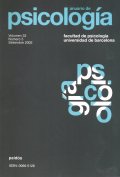Errores cognitivos en jóvenes y su relación con la sintomatología depresiva
Keywords:
Depressive symptomatology, cognitive biases, cognitive distortions, vulnerability, adolescents, risk.Abstract
This research examines the relation between depressive syrnptomatology and cognitive distortions, on the basis of a range of variables. The sample comprised 1,288 young people (683 males and 605 females aged between 12 and 17. The results revealed a solid positive relation between depressive symptomatology and cognitive biases, with lower self-esteemand somatic syrnptoms. The depressive symptomatology rises gradually with age, as do cognitive biases, which are particularly significant at age thirteen. The increase in the cognitive capacities of the young is related to the appearance of cognitive distortions. The cognitive biases predicted depression syrnptomatology. The most,frequent cognitive biases are emotional reasoning, absolutism and catastrophizing. At the beginning of adolescence, absolutism and maximization are prominent, whereas in later years two types of inferences and ernotional reasoning appear. Women
show more depressive syrnptomatology and cognitive biases, and tend to be more ernotional and to dramatize; however, men are characterized by the presence of ccmustu. Finally, all kinds of distortion characterize the subjects with significant scores in depressions and those considered at the risk of mood disorder.
Downloads
Published
2002-01-13
Issue
Section
Articles
License
The authors who publish in this journal agree to the following terms:
Authors transfer to the publisher all copyright for the full term of protection and for all the world.
The authors can post a copy of their articles in accordance with the policy of free access to the journal.


